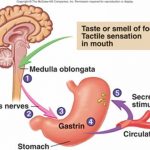Over Eating
Articles, Videos and treatment options for Over Eating
A basic definition of overeating is, simply put, excessive eating—consuming more calories than necessary and generally consuming in large portions that cause a person to feel uncomfortably full. It is not a specific diagnosis; it may refer to a discrete incident of eating too much such as during holidays, celebrations, or while on vacation; or it may refer to habitual excessive eating.
An overview can be found here. Scroll down to see the latest articles and videos.

The study, conducted by researchers at Northwestern University, found that young adults who attended religious events on a regular basis were at a higher risk for becoming obese than their counterparts who did not attend as many religious activities or none at all. The Study The study followed two thousand four hundred and thirty-three young …
Read More

Researchers are working hard to find ways to help restaurant customers choose healthy portions when dining out. Although many establishments offer “super-size” portions to attract customers, there is also a move away from overflowing plates with large calorific portions of French fries or pasta. Researchers are using psychology in order to help consumers trim their …
Read More

Researchers have recently “officially” determined that stress is a major cause of binge eating. Especially around the holidays. The researchers also stated that any major life crisis such as the death of a loved one, divorce, buying a new home, even moving can cause enough stress for a person to engage in binge eating behavior …
Read More

A new study published in the online edition of the American Journal of Preventative Medicine has established that it is possible for extremely obese Americans to lose weight. However, fad diets or pills are ineffective in the long run. Instead, the researchers suggest using the old fashioned method of eating less and exercising more in …
Read More

A study shows that teens that slept less than eight hours per weeknight ate higher proportions of fatty foods and snacks than adolescents who slept eight hours or more. The results suggest that short sleep cycles may increase the risk of obesity risk by causing changes in eating patterns that alter energy balance, especially in …
Read More

Leptin, a hormone associated with the hunger response, has long been theorized to cause overeating – in that people who have leptin resistance are more prone to binge. Yet a new study published in Cell Metabolism reveals that leptin resistance isn’t necessarily the cause of overeating. Researchers blocked leptin action in both lean and obese …
Read More

In one of the latest pieces done by Psychology Today’s Kelly McGonigal, Ph.D., she examines the role of shame in those who are considering illegal action, as well as those considering breaking dieting “rules.” According to the report, shame is not effective in both instances. Petty theft, prostitution solicitation and having unprotected sex all seem …
Read More

Stress can trigger an eating disorder, and for the college student who is away from home for the first time, the stress them more likely to developing an eating disorder. Symptoms of an Eating Disorder “Boggiano says the common signs of an eating disorder include: A preoccupation with calculating calories, fat grams and carbohydrate grams, …
Read More

While diet and fitness apps can help you track calories and food choices, a new gadget eliminates the need to manually input information – and it can alert you when you’re overeating. The SmartPlate, which was developed by Anthony Ortiz, founder and CEO of Fitly, instantly tracks and analyzes everything you eat. With weight sensors …
Read More

In the March 23, 2011 issue of The Journal of Neuroscience, Oregon Research Institute (ORI) senior scientist Eric Stice, Ph.D. and colleagues, including Dana Small, Ph.D. from the J.B. Pierce Laboratory in New Haven Connecticut, provide possible answers to the chicken or egg dilemma of overeating. Do youths overeat just to eat or is their …
Read More
 Eating Disorder Self Test. Take the EAT-26 self test to see if you might have eating disorder symptoms that might require professional evaluation. All answers are confidential.
Eating Disorder Self Test. Take the EAT-26 self test to see if you might have eating disorder symptoms that might require professional evaluation. All answers are confidential.
Find a Treatment Facility Near You
Click on a state below to find eating disorder treatment options that could be right for you.










 Eating Disorder Self Test. Take the EAT-26 self test to see if you might have eating disorder symptoms that might require professional evaluation. All answers are confidential.
Eating Disorder Self Test. Take the EAT-26 self test to see if you might have eating disorder symptoms that might require professional evaluation. All answers are confidential.